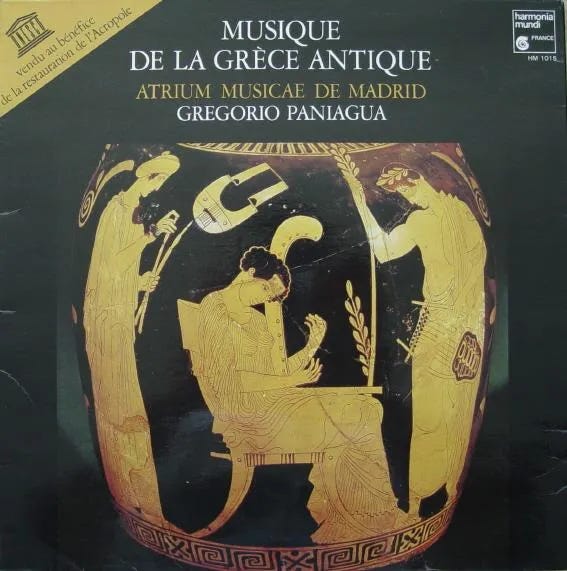EVERY GENRE PROJECT - February 9 - Ancient Greek Music
Genre of the Day - Ancient Greek Music
Album of the Day - Musique de la Grèce Antique by Atrium Musicae de Madrid / Gregorio Paniagua
Although the exact number of recorded songs remains elusive due to the vastness and nebulousness of the recording industry and bad records (no pun intended), estimates suggest it could be anywhere from 97 to 230 million put out since 1860’s recording of “Au Clair de la Lune.'' One wonders, though, how many countless melodies and tunes existed in the thousands of years of human history prior to that recent date, songs that weren’t deemed important enough to pass on, songs that were never written down, unique sounds we’ll never hear again. Luckily for us, though, a handful of ancient cultures dabbled in musical notation, including the ancient Greeks. The all-encompassing presence of music in Greece led to musical notation being pretty widespread, demonstrating the eternal human desire to send a favorite song to a friend.
Music is perhaps so fundamental to our understanding of ancient Greece that it’s literally reflected etymologically: the word music comes from the ancient Greek deities the Muses, the patron goddesses of all things artsy, including musical endeavors. Greek philosophers were quite concerned with music and often incorporated into their understandings of the universe, such as the Pythagorean notion that the planets and their celestial proportions were a form of music. Old men griping about new-fangled music was as prevalent in ancient Greek discourse as it is today: a cranky Plato once complained of the changes in musical etiquettes, saying, “There were no whistles, unmusical mob-noises, or clapping for applause. The rule was to listen silently and learn; boys, teachers, and the crowd were kept in order by threat of the stick. But later, an unmusical anarchy was led by poets who had natural talent, but were ignorant of the laws of music.”
Whatever Plato liked or didn’t like was irrelevant to the Atrium Musicae de Madrid, a ‘60s ensemble in Spain that decided to compile and record some of the fragments of music surviving from ancient Greece. Most of their musical exploration into the days of yore focused on their own home of Spain, but “Musique de la Grèce Antique” is their most famous recording. This begs the question: why was it put out in French? Did Spain not have any music labels? It’s certainly plausible, as I’m not sure Franco’s economic regime was very conducive to the recording industry.
Enough with theories, onto the music at hand. Across 22 diverse recordings, ranging from half a minute to seven minutes, the Atrium exposes the vast range of musical setups and sounds present in ancient Greece. This music sounds almost avant-garde at times, with many of the pieces being quite mystical and ritualistic like the sparse, rest-heavy Papyrus Wien 29825 (I get archive classification, but could we not have come up with a better name and put the technical name in the liner notes?!). However, other tracks are much more rhythmic and drum-heavy, although ultimately the instrumental focus rests on strummed string instruments. Simply from the names, many of the tracks are hymnal and religious in origin, but many are simply named after specific papyri and without a lyrical translation in my reach, one can only guess. However, it shows the diversity of reasons music was played and the different lenses the Greeks explored it through. It’s fascinating to see that our history of making so many forms of music that fill niches was as relevant among cultures over 2,000 years ago as musical diversification is now. To be able to feel and be transported by the same music as people hundreds of generations ago is something I can’t really convey with words. Shoutout to monks, as the Atrium was founded by one; let’s start getting monks in the booth again.





